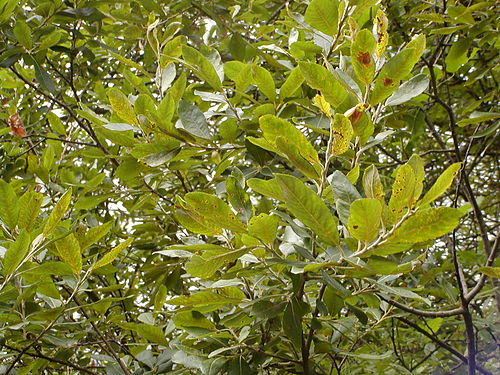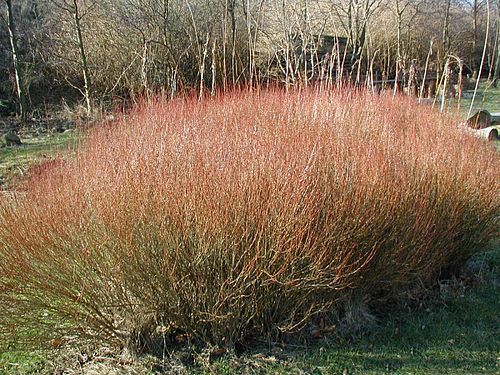Difference between revisions of "Purple Willow"
| (4 intermediate revisions by 2 users not shown) | |||
| Line 1: | Line 1: | ||
| − | + | {{SPlantbox | |
| − | | | + | |familia=Salicaceae |
| − | | | + | |genus=Salix |
| − | | | + | |species=purpurea |
| − | | | + | |taxo_author=L. |
| − | | | + | |common_name=Purple Willow, Purple Osier, Alaska blue willow, Arctic willow, Purple osier willow |
| − | | | + | |name_ref=Flora - A Gardener's Encyclopedia |
| − | | | + | |habit=tree |
| − | | | + | |habit_ref=Flora - A Gardener's Encyclopedia |
| − | | | + | |Max ht box=15 |
| − | | | + | |Max ht metric=ft |
| − | | | + | |height_ref=Flora - A Gardener's Encyclopedia |
| − | | | + | |Max wd box=15 |
| − | | | + | |Max wd metric=ft |
| − | | | + | |width_ref=Flora - A Gardener's Encyclopedia |
| − | | | + | |lifespan=perennial |
| − | | | + | |life_ref=Flora - A Gardener's Encyclopedia |
| − | | | + | |exposure=sun |
| − | | | + | |sun_ref=Flora - A Gardener's Encyclopedia |
| − | | | + | |water=wet, moist |
| − | | | + | |water_ref=Sunset National Garden Book |
| − | | | + | |features=flowers |
| − | | | + | |flower_season=early spring, mid spring, late spring |
| − | | | + | |flower_ref=Flora - A Gardener's Encyclopedia |
| − | | | + | |flowers=red, pink |
| − | | | + | |Temp Metric=°F |
| − | + | |min_zone=5 | |
| − | | | + | |usda_ref=Flora - A Gardener's Encyclopedia |
| − | | | + | |max_zone=10 |
| + | |image=Salix purpurea purpurea.JPG | ||
| + | |image_width=200 | ||
| + | |image_caption=Purple Willow illustration | ||
}} | }} | ||
| + | '''''Salix purpurea''''' ('''Purple Willow''' or '''Purple Osier''') is a species of [[willow]] native to most of [[Europe]] and western [[Asia]] north to the [[British Isles]], [[Poland]], and the [[Baltic States]].<ref name=fe>Flora Europaea: [http://rbg-web2.rbge.org.uk/cgi-bin/nph-readbtree.pl/feout?FAMILY_XREF=&GENUS_XREF=Salix&SPECIES_XREF=purpurea&TAXON_NAME_XREF=&RANK= ''Salix purpurea'']</ref><ref name=rdm>Meikle, R. D. (1984). ''Willows and Poplars of Great Britain and Ireland''. BSBI Handbook No. 4. ISBN 0-901158-07-0.</ref><ref name=rushforth>Rushforth, K. (1999). ''Trees of Britain and Europe''. Collins ISBN 0-00-220013-9.</ref> | ||
| + | |||
| + | It is a [[deciduous]] [[shrub]] growing to 1-3 m (rarely to 5 m) tall, with purple-brown to yellow-brown shoots, turning pale grey on old stems. The [[leaf|leaves]] are 2-8 cm (rarely to 12 cm) long and 0.3-1 cm (rarely 2 cm) wide; they are dark green above, glaucous green below, and unusually for a willow, are often arranged in opposite pairs rather than alternate. The [[flower]]s are small [[catkin]]s 1.5-4.5 cm long, produced in early spring; they are often purple or red in colour, whence the name of the species (other willows mostly have whitish, yellow or green catkins).<ref name=rdm/><ref name=rushforth/> | ||
| + | |||
{{Inc| | {{Inc| | ||
'''''[[Salix]] purpurea'''''. (S. Forbyana, Smith. Vetrix purpurea, Rafin.). Purple Osier. A shrub or small tree, spreading at base, with long, flexible branches: lvs. oblanceolate, serrulate, glabrous, veiny, 3-6 in. long, often appearing opposite: aments sessile, slender; pistillate recurved; scales purple; stamen 1: caps. small, ovate. Eu.—Planted as an ornamental shrub and escaped in many places. Also grown as a basket-willow. Var. pendula, Dipp. (S. nigra pendula, Hort. S. Americana pendula, Hort.). Branches pendent. | '''''[[Salix]] purpurea'''''. (S. Forbyana, Smith. Vetrix purpurea, Rafin.). Purple Osier. A shrub or small tree, spreading at base, with long, flexible branches: lvs. oblanceolate, serrulate, glabrous, veiny, 3-6 in. long, often appearing opposite: aments sessile, slender; pistillate recurved; scales purple; stamen 1: caps. small, ovate. Eu.—Planted as an ornamental shrub and escaped in many places. Also grown as a basket-willow. Var. pendula, Dipp. (S. nigra pendula, Hort. S. Americana pendula, Hort.). Branches pendent. | ||
| + | |||
| + | Var. lambertiana, W. D. Koch. Lvs. broader, generally obovate-lanceolate, more abruptly acuminate, usually more rounded at the base, up to 4 in. long and 3/4 in. broad. Var. sericea, W. D. Koch. Lvs. silky when young, becoming glabrous. Here belongs the "Kecks Willow" (var. Kecksii, Hort.). Var. amplexicaulis, Boiss. Lvs. sessile or subsessile, cordate or rounded at the base, acuminate, oblong to oblong-lanceolate, glabrous. | ||
}} | }} | ||
==Cultivation== | ==Cultivation== | ||
| − | + | ||
===Propagation=== | ===Propagation=== | ||
| − | + | ||
===Pests and diseases=== | ===Pests and diseases=== | ||
| − | |||
| − | == | + | |
| − | + | ==Varieties== | |
| + | |||
==Gallery== | ==Gallery== | ||
| − | |||
| − | <gallery> | + | <gallery perrow=5> |
| − | + | File:Salix purpurea purpurea 1.JPG | |
| − | + | File:Salix-purpurea-habit.JPG | |
| − | + | File:Salix purpurea.JPG | |
| + | File:Salix purpurea 002.jpg | ||
</gallery> | </gallery> | ||
==References== | ==References== | ||
| + | <references/> | ||
*[[Standard Cyclopedia of Horticulture]], by L. H. Bailey, MacMillan Co., 1963 | *[[Standard Cyclopedia of Horticulture]], by L. H. Bailey, MacMillan Co., 1963 | ||
<!--- xxxxx *Flora: The Gardener's Bible, by Sean Hogan. Global Book Publishing, 2003. ISBN 0881925381 --> | <!--- xxxxx *Flora: The Gardener's Bible, by Sean Hogan. Global Book Publishing, 2003. ISBN 0881925381 --> | ||
| Line 64: | Line 74: | ||
{{stub}} | {{stub}} | ||
| − | + | __NOTOC__ | |
| − | |||
| − | |||
Latest revision as of 18:30, 7 May 2010
| Habit | tree
| |
|---|---|---|
| Height: | ⇕ | 15 ft"ft" can not be assigned to a declared number type with value 15. |
| Width: | ⇔ | 15 ft"ft" can not be assigned to a declared number type with value 15. |
| Lifespan: | ⌛ | perennial |
| Bloom: | ❀ | early spring, mid spring, late spring |
| Exposure: | ☼ | sun |
|---|---|---|
| Water: | ◍ | wet, moist |
| Features: | ✓ | flowers |
| USDA Zones: | 5 to 10 | |
| Flower features: | ❀ | red, pink |
|
Salix > |
purpurea > |
L. > |
Salix purpurea (Purple Willow or Purple Osier) is a species of willow native to most of Europe and western Asia north to the British Isles, Poland, and the Baltic States.[1][2][3]
It is a deciduous shrub growing to 1-3 m (rarely to 5 m) tall, with purple-brown to yellow-brown shoots, turning pale grey on old stems. The leaves are 2-8 cm (rarely to 12 cm) long and 0.3-1 cm (rarely 2 cm) wide; they are dark green above, glaucous green below, and unusually for a willow, are often arranged in opposite pairs rather than alternate. The flowers are small catkins 1.5-4.5 cm long, produced in early spring; they are often purple or red in colour, whence the name of the species (other willows mostly have whitish, yellow or green catkins).[2][3]
Read about Purple Willow in the Standard Cyclopedia of Horticulture
|
|---|
|
Salix purpurea. (S. Forbyana, Smith. Vetrix purpurea, Rafin.). Purple Osier. A shrub or small tree, spreading at base, with long, flexible branches: lvs. oblanceolate, serrulate, glabrous, veiny, 3-6 in. long, often appearing opposite: aments sessile, slender; pistillate recurved; scales purple; stamen 1: caps. small, ovate. Eu.—Planted as an ornamental shrub and escaped in many places. Also grown as a basket-willow. Var. pendula, Dipp. (S. nigra pendula, Hort. S. Americana pendula, Hort.). Branches pendent. Var. lambertiana, W. D. Koch. Lvs. broader, generally obovate-lanceolate, more abruptly acuminate, usually more rounded at the base, up to 4 in. long and 3/4 in. broad. Var. sericea, W. D. Koch. Lvs. silky when young, becoming glabrous. Here belongs the "Kecks Willow" (var. Kecksii, Hort.). Var. amplexicaulis, Boiss. Lvs. sessile or subsessile, cordate or rounded at the base, acuminate, oblong to oblong-lanceolate, glabrous.
|
Cultivation
Propagation
Pests and diseases
Varieties
Gallery
References
- Standard Cyclopedia of Horticulture, by L. H. Bailey, MacMillan Co., 1963
External links
- w:Purple Willow. Some of the material on this page may be from Wikipedia, under the Creative Commons license.
- Purple Willow QR Code (Size 50, 100, 200, 500)




